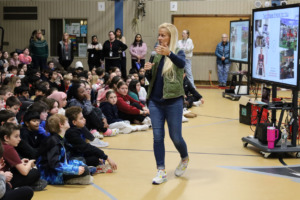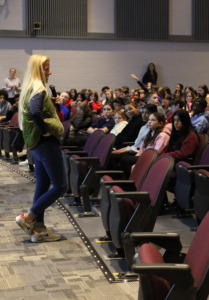On Thursday, Jan. 23, 2025, Katie Greer spoke at both middle schools – Parker and McCarthy – walking kids through a decision-making process that considers the immediate and long-term impact of everything they do online – the AWESOME and the not-so-awesome. Her content varied slightly for each grade level. Later that same day, she also spoke with parents/guardians to provide some guidance on navigating through this digital world.
In all her presentations, Katie stressed: Each family makes the decision that’s best for them when it comes to whether or not kids get smartphones, can participate in online gaming, etc. There’s no one rule that works for all.
Read: Digital health and safety expert speaks to Chelmsford students
Did you know?
Thirteen (13) is the age set by Congress in the Children’s Online Privacy Protection Act (COPPA) for social media accounts. Some states have increased this to age 16.
- If someone under age 13 has a social media account and it is hacked, there is ZERO protection. Hacking happens EVERY day.
- Existing accounts can be suspended until the account holder reaches age 13 – when they’re reactivated all original content is still in place.
Gaming online?
Kids playing games online should never play with someone they don’t know. It’s dangerous.
- Inappropriate stuff happens in appropriate games.
- Check your settings: create your own server, turn chat off, play solo or invite only.
What are Digital Footprints?
Digital footprints are the traceable data and activity a user leaves on the internet.
- Anything you put in email or text or post on social media becomes a permanent digital footprint.
- Everyone should: Think before posting!

How can you verify something is real and accurate before spreading false information?
AI can now make anything look real or appear true.
- Look things up on Snopes.
- Do a reverse Google image search, check the photo ID, and/or go to AI generator sites to verify whether an image is real.
Have you heard of Ship Accounts?
A profile can be created anonymously that discusses a romantic pairing between two people. The term “ship” is a shortened version of “relationship”.
- These accounts can become a form of cyberbullying.
- Delete them. Do not create them, or participate in them.
Who is a Cyber Bully?
Anyone who sends any online communication to deliberately frighten, embarrass, harass or otherwise target another person.
- Cyberbullying includes sending, posting, or sharing negative, harmful, false, or mean content about someone else. Mean posts are a permanent record of your hate.
- Some cyberbullying crosses the line into unlawful or criminal behavior.
Why is social media not smart for middle school students?
Social media was not designed for middle school students – their underdeveloped frontal cortex can’t manage all the complexities it encompasses.
- It’s entertainment technology and it’s addictive.
- It replaces learning the importance of dealing face-to-face with peers.
How do I utilize parental controls?

Manage your student’s online activity by restricting access to specific content, setting screen time limits, monitoring location, and controlling app downloads.
- Begin with controls available through your child’s device, then you can add personalized content filters to even filter out specific words like “stupid”.
- According to a Wall Street Journal investigation, apps like TikTok, Instagram, and Snapchat are where minors are getting the most exposure to sexually explicit and harmful content.
Online Privacy?
There can be some expectations, but there are no guarantees.
- A record exists of everything even if you’ve deleted something.
- Screenshots can be taken of Snapchat posts before they “disappear”.
Research and statistics?
On average, a person’s brain is not fully developed until age 25 and brain scans have shown that screens are detrimental to this development.
- Statistics show that kids ages 13-17 lose a night per week of sleep because of devices in their bedrooms.
- Research indicates that everyone is on their devices twice as much post-pandemic as they were before, adults included.
Technology is great, especially for things like keeping in touch with family members you can’t see in person frequently, and when used to do good in the world. Social media can also be powerful when used to help people but you need to be KIND, polite and respectful. Remember: Once a post is out there, you can’t take it back.



